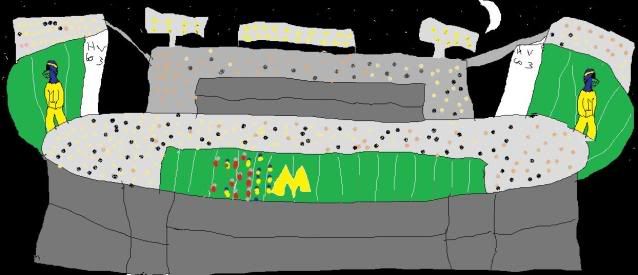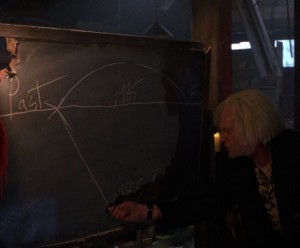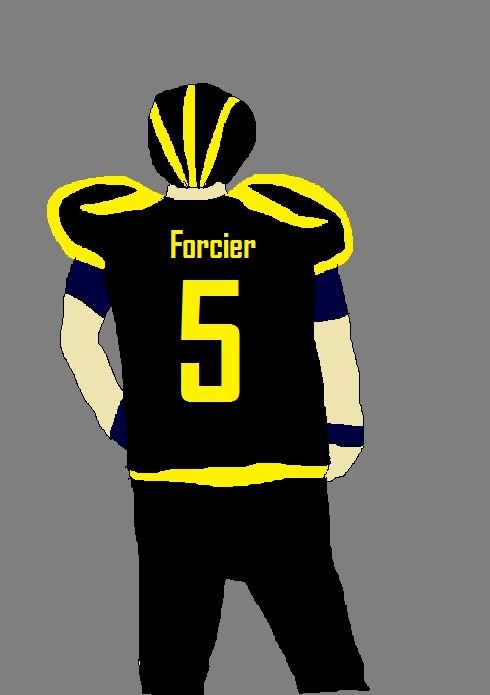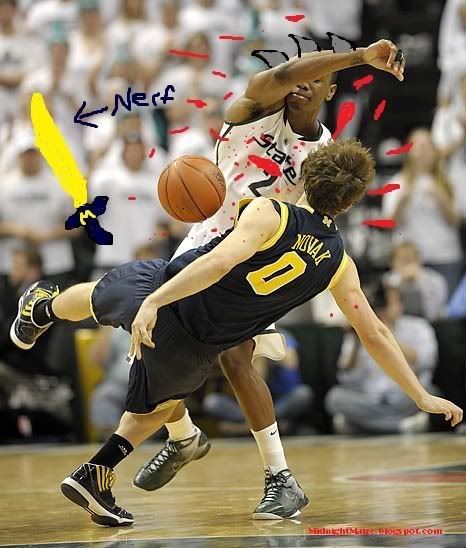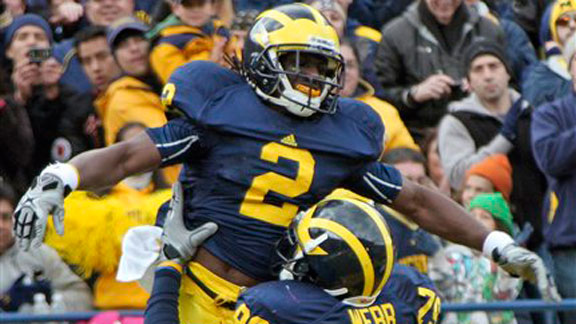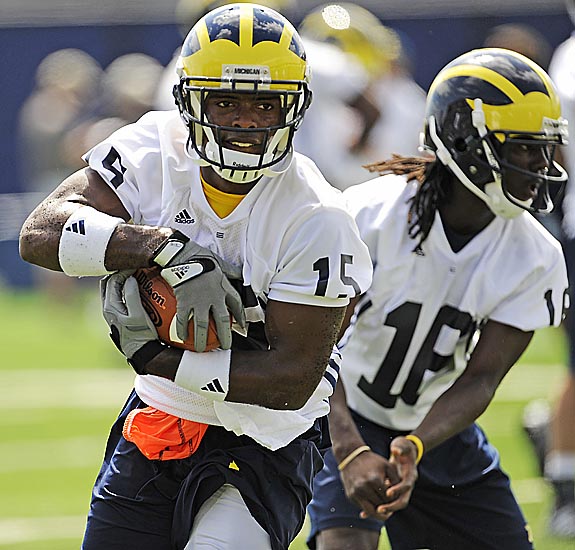Greetings to all from the newest member of Midnight Maize. I am the first person to formerly join this blog in what will hopefully prove to be the post-curse era that began with Michigan getting through the CCHA tournament and earning a highly improbable berth to the NCAA tournament. I will be providing commentary on Michigan sports and sports in general on topics that nobody else here covers. We'll see where that takes me.
This post will be the first in a series of eight posts about the merits and problems of how championships are decided for the four biggest sports in the United States at both the professional and collegiate levels. For the record, these sports are football, basketball, baseball, hockey, and not soccer. In honor of Michigan making it to the NCAA Hockey Tournament in one of these sports, we will cover college hockey first.
Before beginning, I will lay down the criteria by which I will evaluate individual methods of determining championships. Championships ideally should accomplish three things. Firstly, and most importantly, they should crown the most deserving team in the country. Secondly, they should crown the best team in the country. And thirdly, they should be entertaining, which after all, is the purpose of sporting events in the first place. Also, I will be evaluating the methods by which teams are selected to the postseason, in addition to how the postseason itself is run. Now, onto evaluating the NCAA Hockey Tournament.
The NCAA Hockey Tournament is a sixteen team single-elimination tournament. It is also perhaps the worst system of determining a champion in the country. It's ability to crown the most deserving or best team in the country is questionable and it isn't really that entertaining either. Also, the method by which it selects teams for the postseason is simply awful in every respect. To be fair, however, the system isn't entirely bad, so I'll start off with the positive aspects of the tournament.
The NCAA Hockey Tournament concludes with an event called the Frozen Four (which, as you probably have guessed, is a rip-off of the Final Four). Every year, the Frozen Four showcases some excellent hockey and highly exciting games. The chosen venues are almost always NHL stadiums (this year it's at Ford Field, which is also decent), and great places to watch hockey. Furthermore, the tournament itself generally features numerous exciting games and several upsets and is generally enjoyable to watch.
Now onto the tournament's many negatives. First of all, the first two rounds of the tournament are incredibly mismanaged and unfair. The first two rounds (the regional games) often lack television coverage and fail to sell out. Now, the television problem is difficult to solve, although the games are now broadcast on ESPNU and ESPN360. However, the attendance problem is. The NCAA has done several things to improve attendance at regional games. First of all, any team that hosts a regional and makes the tournament gets to play in their home regional. This system has greatly benefitted lower seeded host teams (including Michigan*, to be fair), by giving them de-facto home games against clearly superior teams, making upsets much more likely. Second of all, the NCAA will reseed teams in an attempt to boost attendance at games (this year, they put Michigan, the overall 12 seed up against Bemidji State, the overall 8 seed, in Fort Wayne so that the attendance there would be higher). The thing is, attendance is still often a problem, with the regionals that do not include home (or nearby) teams often failing to even come close to selling out. So basically, the NCAA Hockey Regionals are often a poor draw attendance-wise, despite sacrificing fairness in an attempt to boost attendance. What I fail to understand is why the NCAA just doesn't give the higher seeded team a home game, because that way the higher seed gets the advantage automatically and attendance would become a non-issue.
Second of all, the single game elimination system in the early rounds is something of a problem. It certainly makes upsets more likely and the games more exciting in some respects, but there are problems with this model. First of all, there is a lot of parity among the upper tier teams in college hockey. To illustrate this parity, let us look at one of the 1-4 seed match-ups in this years tournament, Boston College v Alaska. Using the best existing statistical model for college hockey (the
KRACH), Boston College would win a neutral ice game between these two teams about 3 out of every 5 times. So while it would be an upset if Alaska won, it isn't exactly something earth-shattering. Furthermore, the overall top seeded team in hockey this year, Miami University (as in Miami OH), amassed a winning percentage of .7439, meaning that they averaged winning less than 3 out of every four games. The problem here is that hockey has a lot of parity and because there are only two bids that go to lower tier conferences (one of which will disappear next year), the top teams get a highly difficult road through the tournament. What this basically amounts to is a system where your champion is whoever played well for a four game stretch, rather than which team is the best team. It seems much more logical, giving the existing parity in college hockey, to either add a week to the tournament or shorten the season by a week, so that the opening rounds at least can be best of three series, rather than a 1 and done deal where the 1-seeds get few advantages. That said, of the tournament's negatives, the single elimination format is probably the smallest problem.
Finally, the biggest problem by far is the system by which teams are selected for the tournament. Often, the last teams into the tournament have a shot of winning it. For instance, the last team into the tournament in the 2007-08 was Notre Dame, who made it to the championship game against Boston College (where they mercifully lost after beating Michigan in the first round of the Frozen Four). So picking them fairly is important.
Currently, the NCAA Hockey Tournament Selection Committee selects teams through a rigid set of criteria that form what is known as the Pairwise Rankings. The general idea of the Pairwise Rankings is that you take the top 25 teams in the RPI and compare each team with every other team. Each comparison takes into four factors into account: RPI, record against other teams in the top 25 of the RPI, record against common opponents, and head-to-head record, with RPI being the tiebreaker. The teams are then ranked based on number of comparisons won (For a more in depth explanation of the Pairwise Rankings, see
USCHO).
This system is completely idiotic. First of all, taking the top 25 teams into the rankings is purely arbitrary. The point of doing so is to take the teams that would be considered for the tournament. However, no team ranked 21-25 has ever come close to receiving an at-large bid, so including those teams makes no sense and simply boosts some teams records against teams-under-consideration and downgrades others. However, this practice is not nearly as bad as including the records against common opponents in individual comparisons. The Common-Opponents component to the Pairwise Rankings has two effects. The first is to give absurd weight to non-conference schedules. For instance, Vermont and Michigan shared one common opponent this year (Boston U). Michigan lost at Boston U early in the season, which ultimately caused Michigan to lose the comparison to Vermont. Vermont made it into the tournament by virtue of winning one more comparison than Ferris State. Meanwhile, Ferris State lost a comparison to Michigan State because they had a 14-10-6 record against common opponents and Michigan State had a 13-9-6 record against common opponents, meaning that Michigan State had a superior winning percentage against common opponents and thus took the comparison, which knocked Ferris State out of the tournament. And then there's Minnesota-Duluth, who lost a single game at Vermont, which caused them to lose comparisons to UMass-Lowell and Boston University, both of whom played three games against Vermont. Boston University actually went (0-2-1) against Vermont with the tie coming at home. Those comparisons cost Minnesota-Duluth a spot in the tournament. There were even more incidents like these this year, as there are every year, which led potentially deserving tournament teams to lose out on spots in the tournament based on some extremely obscure reasoning that defies any sort of rationality. It is this system that makes the College Hockey Championship so incredibly bad.
*Michigan hasn't hosted a regional since 2003, allegedly because the NCAA does not appreciate the student section at Yost due to the penalty cheer. I cannot verify the accuracy of this, but I wouldn't be surprised if it were true.



 6:30 PM
6:30 PM
 The Shredder
,
The Shredder
,

